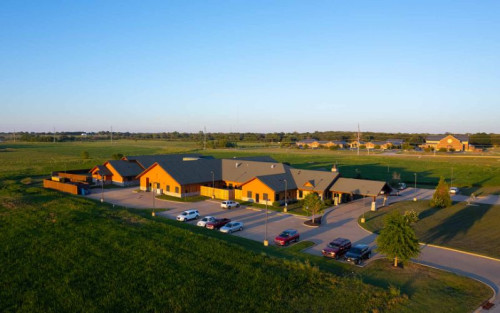
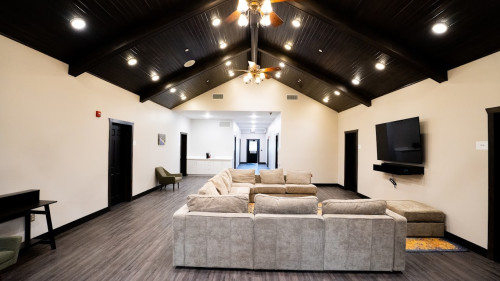
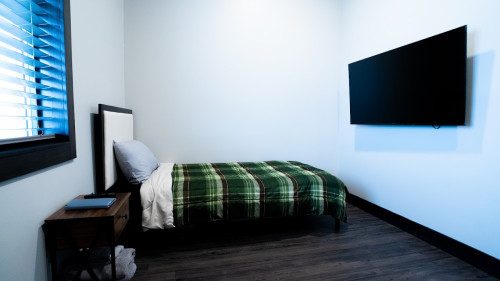



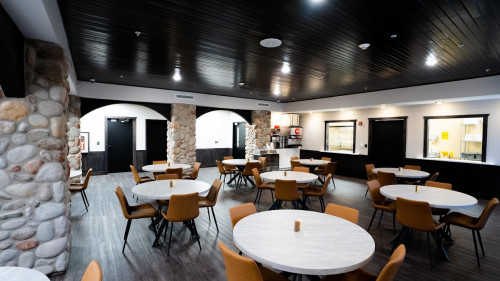
Grand Falls Recovery Center
Verified Center
This provider's information has been quality-checked by Recovery.com's Research Team for accuracy and completeness, including center verification through appropriate third-party organizations.
Treatment Focus
This center treats substance use disorders and co-occurring mental health conditions. Your treatment plan addresses each condition at once with personalized, compassionate care for comprehensive healing.
Primary Level of Care
Offering intensive care with 24/7 monitoring, residential treatment is typically 30 days and can cover multiple levels of care. Length can range from 14 to 90 days typically.
Treatment Focus
This center treats substance use disorders and co-occurring mental health conditions. Your treatment plan addresses each condition at once with personalized, compassionate care for comprehensive healing.
Primary Level of Care
Offering intensive care with 24/7 monitoring, residential treatment is typically 30 days and can cover multiple levels of care. Length can range from 14 to 90 days typically.
Provider's Policy
Most major insurance companies can help pay for rehab. Contact us to verify your benefits and see if insurance can help pay for your recovery. Grand Falls Recovery is unable to accept state insurance, Medicaid or Medicare.
Grand Falls Recovery Center
Grand Falls Recovery Center
About Grand Falls Recovery Center
Grand Falls Center for Recovery provides treatment for addiction and co-occurring mental health conditions. They use a variety of evidence-based therapies and treatment, with an initial assessment determining which level of care would suit each client best. Grand Falls Center for Recovery offers detox services, residential treatment, an intensive outpatient program (IOP), a partial hospitalization program (PHP), and aftercare.
Medically Monitored Detox
Grand Falls Center for Recovery offers on-site detox. In detox, medical and support staff monitor clients 24/7 to help with withdrawals and to keep each client as comfortable as possible. The exact time clients spend in detox depends on their unique situation, with 7 days being average. After detox, clients begin residential treatment, PHP, or IOP.
Residential, IOP, And PHP
Grand Falls Center for Recovery provides multiple levels of care for greater flexibility. Clients can find and join a level of care that fits their lifestyle and needs. PHP and IOP welcome clients during the day. In a residential setting, clients stay on-site day and night. Grand Falls Center for Recovery provides semi-private rooms, each with an ensuite. Their center rests on 10 acres, allowing clients to navigate recovery in a serene and restorative environment.
Specialized Treatment Programs
Grand Falls Center for Recovery offers gender-specific treatment for men, women, and LGBTQ+ clients. They provide safe spaces for each group to open up in group and 1:1 therapies. Professionals can access their laptops and phones for business purposes, if desired.
Admissions Process

Highlights from the Center
Highlights
These highlights are provided by and paid for by the center.
Customized Treatment Plans
Co-Occurring Disorders Treatment
On-site Medical Detox
Tech Friendly
Center Overview
Treatment Focus
This center treats substance use disorders and co-occurring mental health conditions. Your treatment plan addresses each condition at once with personalized, compassionate care for comprehensive healing.
Joint Commission Accredited
The Joint Commission accreditation is a voluntary, objective process that evaluates and accredits healthcare organizations (like treatment centers) based on performance standards designed to improve quality and safety for patients. To be accredited means the treatment center has been found to meet the Commission's standards for quality and safety in patient care.
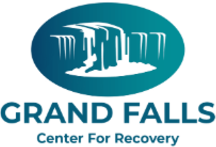
Insurance Accepted
Cash Pay Rates
Estimated Cash Pay Rate
Center pricing can vary based on program and length of stay. Contact the center for more information. Recovery.com strives for price transparency so you can make an informed decision.
Meet Your Care Team

Josh Anderson
Director of Operations

Courtney Rice
LMSW- Clinical Supervisor

Stacy Wagner
Director Of Nursing

Derek Collier
HR Manager
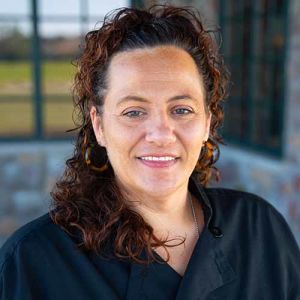
Ashley Hackett
Chef




Levels of Care








Your Care Options
Specializations
Alcohol
Using alcohol as a coping mechanism, or drinking excessively throughout the week, signals an alcohol use disorder.
Drug Addiction
Drug addiction is the excessive and repetitive use of substances, despite harmful consequences to a person's life, health, and relationships.
Heroin
Heroin is a highly addictive and illegal opioid. It can cause insomnia, collapsed veins, heart issues, and additional mental health issues.
Opioids
Opioids produce pain-relief and euphoria, which can lead to addiction. This class of drugs includes prescribed medication and the illegal drug heroin.
Professionals
Busy, high-ranking professionals get the personalized treatment they need with greater accommodations for work, privacy, and outside communication.
Who We Treat
Executives
Executive treatment programs typically directly support the needs of people who manage businesses and may provide flexible schedules and office space to allow work during treatment.
LGBTQ+
Addiction and mental illnesses in the LGBTQ+ community must be treated with an affirming, safe, and relevant approach, which many centers provide.
Professionals
Busy, high-ranking professionals get the personalized treatment they need with greater accommodations for work, privacy, and outside communication.
Approaches
Evidence-Based
A combination of scientifically rooted therapies and treatments make up evidence-based care, defined by their measured and proven results.
Individual Treatment
Individual care meets the needs of each patient, using personalized treatment to provide them the most relevant care and greatest chance of success.
Gender-Specific
Separate treatment for men or women can create strong peer connections and remove barriers related to trauma, shame, and gender-specific nuances.
Therapies
1-on-1 Counseling
Patient and therapist meet 1-on-1 to work through difficult emotions and behavioral challenges in a personal, private setting.
Couples Counseling
Partners work to improve their communication patterns, using advice from their therapist to better their relationship and make healthy changes.
Family Therapy
Family therapy addresses group dynamics within a family system, with a focus on improving communication and interrupting unhealthy relationship patterns.
Life Skills
Teaching life skills like cooking, cleaning, clear communication, and even basic math provides a strong foundation for continued recovery.
Massage Therapy
Massage therapy relieves physical and emotional tension, reduces pain, promotes relaxation, and improves emotion regulation.
Conditions We Treat
Internet Addiction
Internet addiction is common among children teens. This compulsive disorder can damage relationships, school performance, sleep habits, and physical health.
Substances We Treat
Alcohol
Using alcohol as a coping mechanism, or drinking excessively throughout the week, signals an alcohol use disorder.
Co-Occurring Disorders
A person with multiple mental health diagnoses, such as addiction and depression, has co-occurring disorders also called dual diagnosis.
Cocaine
Cocaine is a stimulant with euphoric effects. Agitation, muscle ticks, psychosis, and heart issues are common symptoms of cocaine abuse.
Drug Addiction
Drug addiction is the excessive and repetitive use of substances, despite harmful consequences to a person's life, health, and relationships.
Heroin
Heroin is a highly addictive and illegal opioid. It can cause insomnia, collapsed veins, heart issues, and additional mental health issues.
Opioids
Opioids produce pain-relief and euphoria, which can lead to addiction. This class of drugs includes prescribed medication and the illegal drug heroin.
Languages
Care Designed for Your Needs
Personal Amenities
Amenities
Special Considerations
Executive Program
Addiction and mental health treatment for executives typically involves high discretion, greater technology access, and more private, 1-on-1 care.
Flexible technology policies
Centers with flexible technology policies allow professionals to stay in touch with work and give patients a greater sense of connection and normalcy.
Healthy Meals are provided
Great food meets great treatment, with providers serving healthy meals to restore nutrition, wellbeing, and health.
Activities

What people are saying
Treatment
4.2
Accommodations
4.8
Food & Nutrition
3.8
Value
4.5
Pros
- Friendly & Competent Staff (3)
- Luxurious Accommodations (2)
- Excellent & Effective Treatment Programming (2)
- Gourmet & Nutritious Food (2)
Blake
Treatment in 2023 • (30 days) • Reviewed 04/24/23
Former Client
•Heavy equipment operator
•New jersey
Trana
Treatment in 2023 • (28 days) • Reviewed 04/25/23
Former Client
•Carl Junction mo
Rts
Treatment in 2023 • (22 days) • Reviewed 04/24/23
Former Client
•Job Foreman
•Independence, Missouri





